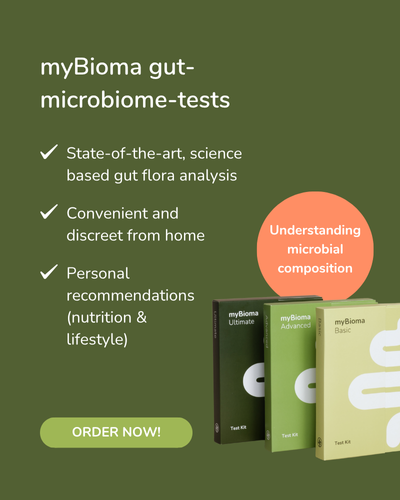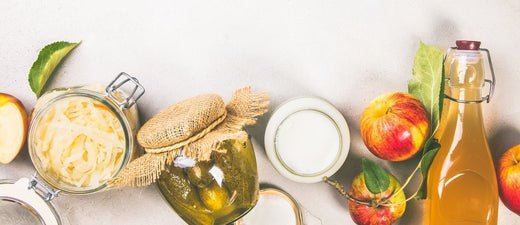Table of contents
- 1. What happens if you have diarrhea?
- 2. The “normal” diarrhea
- 3. If diarrhea doesn't go away...
- 4. Mystery Irritable Bowel Syndrome
- 5. How the microbiome leads to irritable bowel syndrome
- 6. The intestinal bacteria determine between diarrhea and constipation
- 7. Drink enough
- 8. Look at your diet
- 9. Pay attention to balance
- 10. Go to the doctor!
Everyone knows it, but what if it becomes a long-term companion: Diarrhea is extreme /span>unpleasant and sometimes painful. For many of us it's part of being sick occasionally, but for some others it becomes chronic and impaired the entire everyday life. But why do so many people suffer from chronic diarrhea? Irritable bowel syndrome ? What role do they play in this? Intestinal bacteria ? All that and what you against stubborn diarrhea you can find out here 10 steps .
1. What happens if you have diarrhea?
Have you ever wondered how diarrhea actually occurs in the intestines? Normally your food will during the digestion Enriched with plenty of liquid – up to nine liters per day gives your small intestine added to food ! The intestines absorb almost everything - 8.9 liters - further down, otherwise we would have great difficulty to stay hydrated . In the case of diarrhea, the intestine either doesn't have enough time to absorb all the water again or certain substances or pathogens in the food cause it Intestine is prevented from absorbing the water. (1)
There are incredibly many Causes of diarrhea ! In the Meidzin we speak of diarrhea if you have liquid stools three times a day or more. What matters most is whether it is acute or chronic. From chronic diarrhea one speaks when he longer than six months and occurs at least once a week. Anything below this is considered acute. (1, 2)

Your diet also plays an important role in diarrhea.
2. The “normal” diarrhea
Acute diarrhea is often the well-known type Gastrointestinal flu and food poisoning . The body catches pathogens, such as Viruses or certain bacteria . The pathogens irritate the intestines and immune system and these sound the alarm: There is something wrong with this food! The The intestines immediately increase the pace , because the poorly digestible food needs to be out of the body as quickly as possible - whether up or down. This Protection mechanism is really clever, because that's how we become pathogens and unpleasant things get going again as quickly as possible and we usually only stay sick for two to three days. So this is completely normal diarrhea 😉 (1)
3. If diarrhea doesn't go away...
But what happens if diarrhea persists for a long time? There are other reasons for this, such as: Intolerances and Allergies against food, Irritable bowel syndrome or Chronic inflammatory bowel disease.
If you have intolerances, a certain food cannot be digested well - this is the case, for example Lactose intolerance , here the problem lies with milk sugar. However, allergies to certain foods, such as nuts or apples, can also arise. Also Celiac disease is a special form of intolerance, namely on gluten (a wheat ingredient). (1)
Rarely, but diarrhea can also occur Chronic inflammatory bowel disease to be triggered. There is probably a complex one here Disruption of the immune system , the intestines and the microbiome, which causes the intestinal lining to be permanently inflamed. (1)
4. Mystery Irritable Bowel Syndrome
One of the most common causes for chronic diarrhea is irritable bowel syndrome. The exact reasons for this are not yet fully understood, but there are already promising theories. The disease probably arises from a disturbed Interaction of immune system , the Intestinal bacteria and external influences, such as Nutrition, medication, psychology and Movement . Irritable bowel syndrome manifests itself differently in every person: for some people it can be very severe Diarrhea , more persistent in others constipation or lead to a mixture of both. The key to explaining this could be in Microbiome lay! (3)

When we have diarrhea, we lose an incredible amount of water - which means we have to drink even more.
5. How the microbiome leads to irritable bowel syndrome
All the bacteria in the intestines form a small one together Universe , which affects your body in many ways and is essential for your health. We know that this is the case with many illnesses Microbiome out of balance – including irritable bowel syndrome. So if you compare the microbiome of people with irritable bowel syndrome with those of healthy people, you discover clear differences . For example, in irritable bowel syndrome the ratio of the bacteria Firmucutes to Bacteroidetes increased and there are fewer Lactobacilli and Collinsella . (4)
6. The intestinal bacteria determine between diarrhea and constipation
Interestingly, there is also Differences depending on the type of irritable bowel syndrome in disrupting the microbiome. For example, people with “diarrheal-irritable bowel syndrome” have more compared to people with “constipated-irritable bowel syndrome”. Streptococci and less Bifidobacteria . There is currently a lack of more precise study data on the irritable bowel subtypes, but in the future could it be possible, just from the Examination of the microbiome to determine whether and which subtype someone suffers from irritable bowel syndrome. We are now taking the steps for this precise analysis ! Here you can find out more about ours Microbiome test . (5)
7. Drink enough
You suffer from irritable bowel syndrome and don't know what can you do about it ? The first step you should pay attention to is this enough to drink . This may not sound particularly exciting, but it is incredibly important! As already mentioned (see point 1), your body can do an incredible amount Lose water through the intestines , which can become a real problem. That's why a lot Drink water or tea ! Incidentally, it is recommended if you have an irritated intestine peppermint tea or oil, Lavender, lemon balm, chamomile and coriander.

Irritable bowel syndrome is also determined by stress and your mental state - relaxation exercises can help.
8. Look at your diet
You may have already noticed that your intestines are on certain foods are particularly sensitive Reacts. There is a concept precisely to recognize these foods and to allow the intestines a recovery phase: FODMAP . You avoid flatulent and difficult-to-digest foods for about a month and reintroduce them step by step. This way you can see through which foods the increase symptoms or be triggered. But be careful, it is FODMAP no long-term solution, because the diet is one-sided and there is a lack of healthy fiber. Rather, it serves to calm the intestines and to look for sustainable solutions. (6)
9. Pay attention to balance
As with many illnesses, yours also plays a role in irritable bowel syndrome mental state a major role. The intestinal problems are often caused by... Stress, inner restlessness, anxiety and accompanied by depression. Most of the time, this results in a vicious circle: stress triggers the irritable bowel syndrome, the intestinal problems frustrate and increase the stress, the intestines get worse, and so on and so forth. About this one To break the vicious circle , it is important to listen to your inner self, reduce stress and live a balanced life. Regular Movement, meditation and time for yourself can help. Think about it, where you have difficulties and what leisure activities could be good for you. These steps do take some time But there is a time until they take effect the more important . (3)
10. Go to the doctor!
Please do not forget Go to the doctor if your symptoms are severe or have persisted for a long time. Chronic diarrhea is serious and may require medical attention. That's why you should do not be shy have to stop by the doctor and to tell honestly about your complaints.
Never forget: You're not alone – an incredible number of other people go through the same symptoms. We hope that the article helped you and there were some interesting tips!

If you have chronic diarrhea, you should see a doctor.
References
- Herold et al. Innere Medizin. Eigenverlag 2012, ISBN 978-3-981-46602-7.
- Lacy B, Mearin F, Chang L, et al. Bowel Disorders. Gastroenterology. 20116; 150:1393–1407.
- Ohman L, Simrén M. Pathogenesis of IBS: role of inflammation, immunity and neuroimmune interactions. Nat Rev Gastroenterol Hepatol. 2010;7(3):163-73.
- Kassinen A, Krogius-kurikka L, Mäkivuokko H, et al. The fecal microbiota of irritable bowel syndrome patients differs significantly from that of healthy subjects. Gastroenterology. 2007;133(1):24-33.
- Jeffery IB, O’toole PW, Öhman L, et al. An irritable bowel syndrome subtype defined by species-specific alterations in faecal microbiota. Gut. 2012;61(7):997-1006.
- Altobelli E, Del negro V, Angeletti PM, Latella G. Low-FODMAP Diet Improves Irritable Bowel Syndrome Symptoms: A Meta-Analysis. Nutrients. 2017;9(9)







